Are you getting anxious about your dog pooping while sleeping? Let me help you identify the underlying issue along with its complete solution.
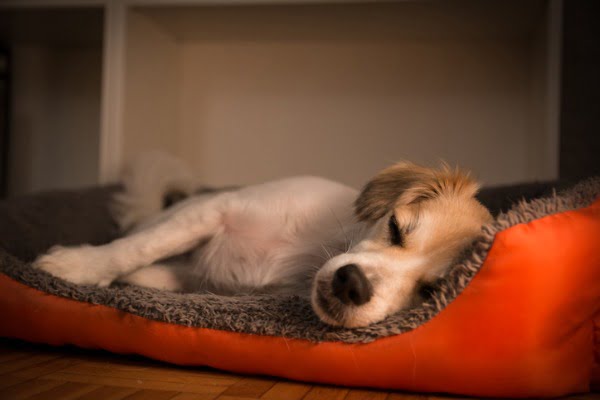
Many factors are responsible for these incontinence bowel movements causing the stool to leak unexpectedly among puppies and adults during sleep.
In most cases, what happens is the dog tends to drop a small amount of feces across his bed without its control and awareness.
What happens, then?
It gives rise to nasty odor, which invites infections and other ailments.
Moreover, dogs can pass out a little poop while barking or getting anxious themselves on account of defecation problems.
All this can be a serious issue, and pet owners show great concern about the underlying condition.
In older dogs, this is actually a very common disorder. Here I’m going to share reliable information that will definitely help you to figure out this dog pooping in sleep issue in your beloved pet.
Causes of Bowel Incontinence in Sleep
- Sphincter incontinence
- Diarrhea
- Gas and bloating
- Constipation
- Aging
- Physical disability
- Diabetes
- Trauma
- Injury
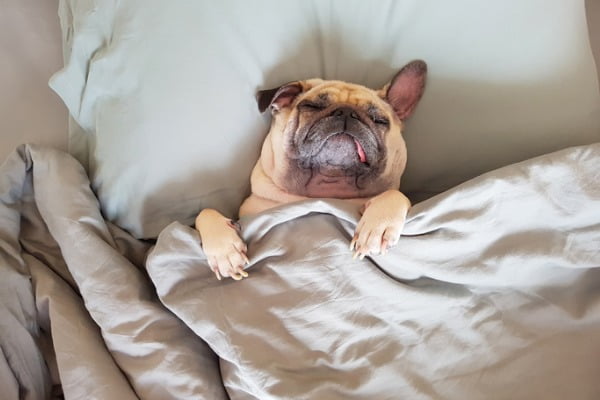
Sphincter Incontinence
This refers to the inability of the anal muscles to remain in a closed position. It is considered the most leading cause of the leaking of stool in dogs.
Generally, there are two possible causes of sphincter incontinence.
- Any lesion such as an anal wound or hanging mass which can disrupt its normal function
- Secondly, any nerve damage from the spinal cord can also invoke the sudden release of stool in dogs.
It’s not uncommon for this to help while awake and certainly during your dog’s sleep cycles at night.
Diarrhea
Another contributing factor towards uncontrolled defecation in dogs while sleeping is diarrhea.
In this disease, the large intestine gets inflamed, and the rectum loses its ability to store poop for a longer period.
Parasitic attacks, ulcers, and gastrointestinal problems are largely associated with this disease.
You must ward off the causes of diarrhea in order to reduce unusual poop exclusion while your dog is resting or overnight.
Gas and Bloating
Gas and bloating issues are generally found in newly born and older dogs.
A swollen stomach or distension alone is referred to as simple bloat. It can occur when your puppy’s stomach is filled with fluids, gas, and food which later on imbibes GDV (gastro dilation volvulus).
It goes without saying that puppies and older dogs sleep a lot, so you’re going to see some “number two” accidents while your dog sleeps.
It is a critical condition during which your pet fails to sustain its feces in the rectum and releases a small portion while sleeping.
This condition certainly demands medical treatment on emergency grounds.
Trauma
Any fearful experience or sudden noise can also invoke sudden defecation in dogs in their sleep states.
Normally, during New Years or 4th of July celebrations, dogs get panic attacks due to the alarming noise of fireworks booming through the sky and neighborhoods.
It will hinder the normal function of the excretory system, and your puppy can defecate in an unusual pattern.
In addition to this, psychological distress also causes bowel incontinence while your dog is in his bed.
Diabetes
In older dogs, the most leading cause of the inability to hold fecal matter in general and while sleeping involves diabetes.
In diabetic pets, glucose levels can augment the sudden release of poop while they are sleeping.
Anal muscles become weak, and their elasticity turns fragile as dog’s age. If it is left untreated, it can cause kidney failure as well.
Aging
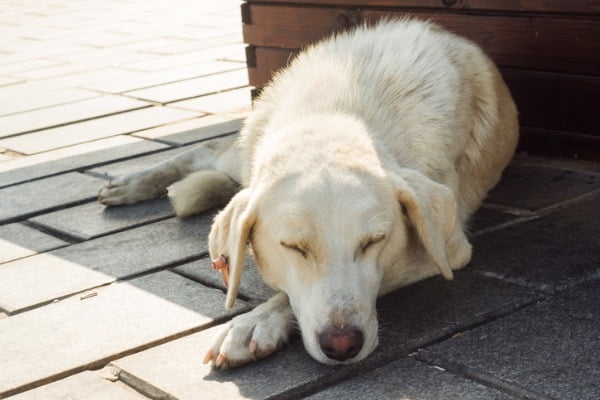
As your dog gets older, the chances of uncontrolled fecal movement may double as compared to middle adulthood.
Besides, they also lose control over the bladder at a later age. As a vet, I have found aging as the major contributing factor towards bowel or urine incontinence.
Your elder dog most certainly feels discomfort if he or she is pooping in its sleep.
Injury
Any type of spinal injury can also be associated with leakage of poop during a dog’s sleep pattern.
Moreover, nerve damage, arthritis, and intervertebral disc disease can also lead to bowel incontinence in dogs.
While sleeping, your puppy can expel small debris of stool on account of these injuries. Definitely consult a vet to look for signs of these types of canine injuries.
Harmful Effects of a Dog Who Poops in Its Sleep:
- Skin irritation
- Inflammation
- Emotional distress
- Anal infections
- Tumors
- Abdominal pain
- Cramping
All of the above are no doubt going to bring discomfort to your dog and be concerning for you. This is why you shouldn’t ignore if your dog is making messes during rest or sleep.
Why Does My Older Dog Poop in His Sleep?
Older dogs are more prone to defecation problems while at rest of any kind.
In most cases, IBD (inflammatory bowel disease) colitis, and diabetes are commonly related to the onset of bowel incontinence.
Signs of aging involve loss of control over rectum muscles. As your fluffy friend ages, their entire excretory system weakens.
Hey, it happens to the best of us!
So, in older dogs, you may notice a small amount of debris around the playing area or around the bed (or any place they zonk out), while your dog is sleeping.
You should consult your veterinarian to have a complete diagnosis and treatment to help slow down or at least make your dog more comfortable when it comes to the end of their digestion process.
Read below for some tips that will definitely help!
Ways to Prevent Your Dog Pooping While Asleep
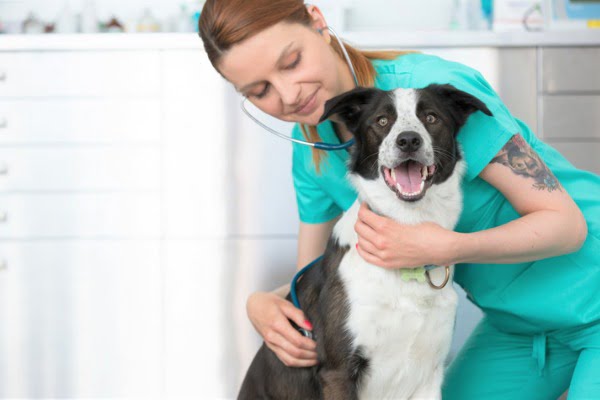
If you notice any unusual behavior in your canine, you must overlook the underlying cause and overcome this issue.
As a vet practitioner, I want to share some trustworthy information about how you can go about helping your dog’s underlying conditions so they can live a happier life – and you have cleaning up to do!
Dietary Modifications
Diet plays an evident role in surpassing any disease. A healthy dog is a happy dog, so it is crucial to take preventive measures before starting any medications your vet might recommend.
If you notice any symptom of diarrhea or loose stool in your dog, especially during the night, you must change his or her diet plan. They will thank you!
What kind of diet is best?
Feeding a low fiber diet can help to reduce the effects of bowel incontinence in your four-legged friend.
And be sure to feed your pet solid food instead of dairy products. Moreover, provide clean and fresh drinking water several times per day to keep them hydrated.
Regular Exercise
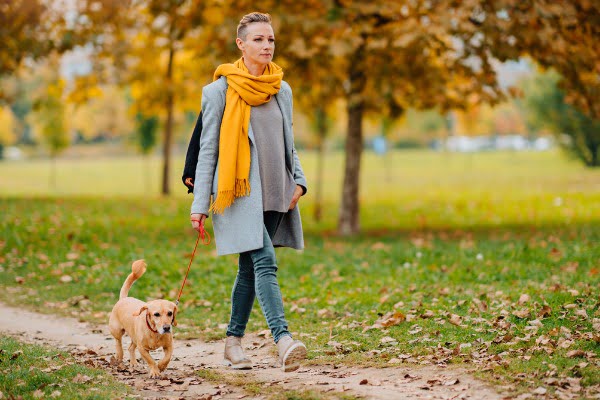
Physical fitness plays an important role in the overall well-being of your doggie.
Regular exercise will help your dog to boost its immunity level, which increases the vitality of life.
A long walk for your pup two times per day on trails, the beach, and throughout your neighborhood will be fruitful for emotional balance and social associations.
Moreover, running and doing different exercises will enhance blood circulation and reduce cholesterol levels in your pet.
Doing the right level of activity for your dog’s age will inhibit various infections and helps your dog to maintain a healthy lifestyle.
And from what you’ve read above, if you can ward off some of these ailments, you’re doing yourself some big favors when it comes to incontrollable dog poops during sleep.
Regular Checkups
Regular checkups are mandatory to overcome bowel incontinence in your dog.
If you notice any restlessness, discomfort, or behavioral change in your pooch, you must consult your vet expert to avert this condition.
Moreover, you should also undertake proper vaccination to prevent the onset of diseases ad infections.
Again, it goes without saying that by doing these precautionary measures, you can minimize the chances of poop expulsion in your dog while sleeping.
Use Disposable Diapers
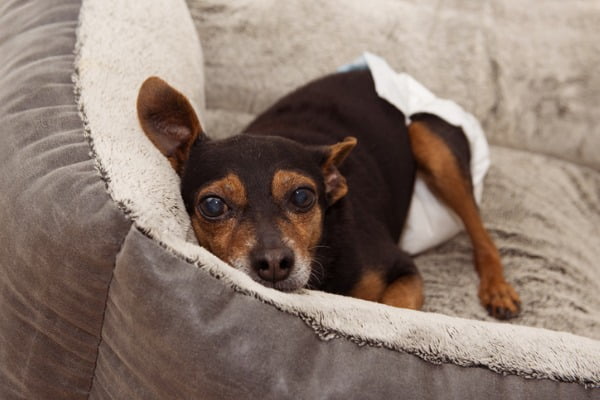
Disposable dog diapers are convenient to use and easy to discard. These are available in every size, just like human children.
At night, you should put this diaper across your dog before going to sleep.
Elderly dogs mostly suffer from uncontrolled urination and defecation issues due to loss of muscle elasticity.
It’s just the way it is.
Besides, you can also opt for cloth diapers as well. As a vet, I would recommend using disposable as the best solution to avoid undesirable poop smell.
They are also going to absorb more as your dog could end up lying in a soiled diaper all night, and the last thing you want is a rashy behind!
Of course, you can also lay down fecal incontinence pads over their bed. This may prove to be easier or harder depending on your situation.
Surgical Treatment
If your dog is diagnosed with what’s called “reservoir incontinence,” it is prudent to undergo surgical treatment.
In this therapy, a wound or mass across the rectum must be removed to sustain normal bowel movement.
For this, you must consult a trusted veterinarian expert to figure out the underlying cause and treatment.
On the contrary, sphincter incontinence in dogs also demands surgical treatment on an immediate basis.
My Concluding Thoughts
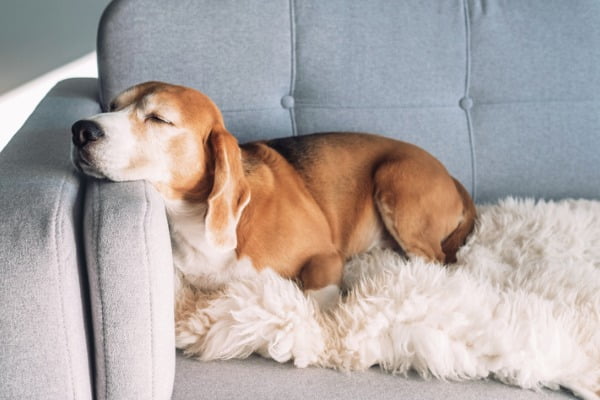
The eradication of bowel incontinence at large and especially during a dog’s sleep, depends upon the underlying cause.
You must consult your vet expert if you observe any unusual behavior in your dog, along with the symptoms of a soiled bed or sleeping area.
While fecal incontinence is most common in older dogs, there are medical reasons that contribute to this problem. On the contrary, psychological issues can also trigger this ailment.
Finally, you must observe your dog and identify the major cause and later treat this condition with proper medication or the related therapy suggested by your veterinarian.
Doing all of the above will help your dog rest easier in a cleaner sleeping spot and make your life a whole lot easier as well.
References:
Mari, L., Behr, S., Shea, A., Dominguez, E., Ricco, C., & Alcoverro, E. et al. (2019). Predictors of urinary or fecal incontinence in dogs with thoracolumbar acute non‐compressive nucleus pulposus extrusion. Journal Of Veterinary Internal Medicine, 33(6), 2693-2700. doi: 10.1111/jvim.15626
Chen, A., Bagley, R., West, C., Gavin, P., & Tucker, R. (2005). Fecal incontinence and spinal cord abnormalities in seven dogs. Journal Of The American Veterinary Medical Association, 227(12), 1945-1951. doi: 10.2460/javma.2005.227.1945
Ogbonnaya KI, Arem R. Diabetic Diarrhea: Pathophysiology, Diagnosis, and Management. Arch Intern Med. 1990;150(2):262–267. doi:10.1001/archinte.1990.00390140018005
Saldana Ruiz, N., & Kaiser, A. M. (2017). Fecal incontinence – Challenges and solutions. World journal of gastroenterology, 23(1), 11–24. https://doi.org/10.3748/wjg.v23.i1.11
Granger, N., Olby, N. J., Nout-Lomas, Y. S., & Canine Spinal Cord Injury Consortium (CANSORT-SCI) (2020). Bladder and Bowel Management in Dogs With Spinal Cord Injury. Frontiers in veterinary science, 7, 583342. https://doi.org/10.3389/fvets.2020.583342
